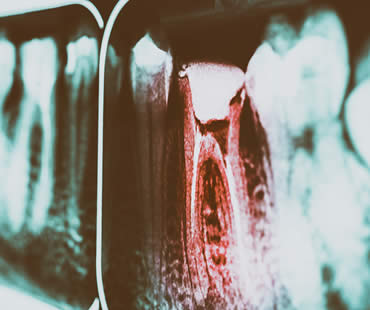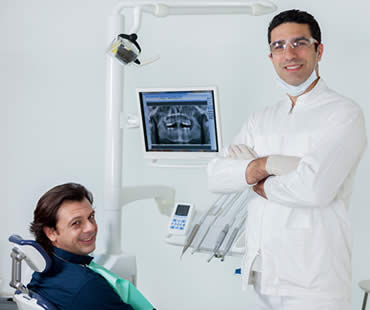
Feb 15, 2019 | Dental Topics 2, Root Canal Treatment, Blog
Root canal therapy is a painless procedure performed when decay has caused enough damage to a tooth that the tooth is dying or has already died. During treatment, your dentist or endodontist removes the diseased or damaged pulp from the tooth and then refills the tooth cavity. To ensure a successful and pleasant treatment, here are some basic do’s and don’ts to follow:
- Do take any medication your dentist has prescribed for you to take prior to root canal therapy.
- Don’t anticipate pain; be calm and relaxed during your treatment.
- Do expect mild discomfort for 2-3 days following the procedure. Apply an ice pack and sleep with your head elevated to minimize swelling.
- Don’t skip on taking prescribed pain medications, even if you are not experiencing extreme pain.
- Do avoid biting on hard foods or meddling with the affected tooth during the course of treatment.
- Don’t drink excessively hot or cold beverages until the completion of treatment.
- Do continue normal brushing on the root canal treated tooth.
- Don’t smoke or drink alcohol within 24 hours of root canal therapy.
- Do eat a soft diet for several days and avoid chewing on the treated tooth until a permanent restoration is placed.
- Don’t delay having the treated tooth capped with a crown or other restoration to avoid fracture or additional damage, causing failure of your root canal therapy.
- Do contact your dental professional immediately should you have any complications or questions during your recovery, and make sure to keep any follow-up appointments scheduled by your dentist or endodontist.
Root canal therapy has a 95% success rate. By following these simple guidelines, you can help to ensure a positive result from your root canal therapy and enjoy many more years of a healthy smile.
We look forward to seeing you in our Conyers dental office

Jun 14, 2019 | Dental Topics 2, Root Canal Treatment, Blog
The desire for a beautiful, healthy, natural smile is universal. Dental procedures such as root canal treatments aren’t something people aspire to have, and there are things you can do personally that can reduce your risk of having a root canal procedure.
Prevention is the best step you can take to avoid root canal therapy, and it all begins with you at home. If you didn’t grow up with good oral hygiene habits, now is the time to develop them. This simple step can lead directly to good oral health. Be sure you are brushing your teeth at least twice a day, following each meal if possible, and absolutely before sleeping. If you don’t brush your teeth before bedtime, you’re providing a robust breeding ground for bacteria to grow and degrade your teeth while you’re sleeping. Floss daily to reach the places between teeth and beneath the gum line that brushing can’t reach.
Fluoride in your toothpaste and in mouthwash can keep your tooth enamel strong and durable. Never give fluoridated toothpastes to children under the age of two years and avoid fluoridated mouthwash until the child is more than six years old.
Maintaining a proper diet ensures that your body is receiving all of the nutrients it needs for health, both orally and elsewhere in the body. Chewing crunchy foods like raw vegetables and hard fruits can help keep your teeth bright and clean, scraping away debris while you chew.
If you are a smoker, you should stop immediately. Not only is it a huge factor in your oral health, but also for your overall health. Smoking contributes directly to lung disease, cancer and heart disease, as well as other health issues. Your dentist or doctor can give you excellent advice about quitting.
Stay hydrated by drinking lots of water and avoiding sugared drinks. Rinse your mouth after consuming soda, coffee, tea or a sports drink.
Be sure to see your dentist twice a year for regular check-ups and cleanings, and keep your risk of a root canal treatment low.
Our dental office is located in Conyers

Feb 24, 2023 | Dental Topics 2, Dentures, Blog
Getting back your ability to smile and eat with a complete set of teeth is one of the great benefits of dentures. To prevent infections, sores, or further tooth damage, it is important to maintain dentures properly. Here are some ways that dentists advise to keep your dentures in great condition.
Cleaning
Rinse your dentures well after meals to remove food particles and avoid stains. Brush them daily with a soft toothbrush to remove plaque and deposits. Use a mild soap or product that your dentist recommends, but avoid harsh toothpaste or strong cleaners.
Soaking
Soak your dentures in water or cleaning solution when you are not wearing them, especially overnight. This helps keeps them from drying out or becoming misshapen. Do not use hot water.
Rinsing
If you use a cleaning solution, rinse your dentures well before putting them back in your mouth. Avoid swallowing denture cleaning solution because it can cause stomach upset.
Handling
Handle your dentures very carefully so that you don’t drop them or bend them. Clean them over a basin filled with water, so that if they fall they shouldn’t be damaged.
Visiting your dentist
Maintain regular checkups with your dentist to get both your mouth and your dentures examined. Most dentists recommend visits every six month for ideal results. See your dentist sooner if your dentures are not fitting well, are causing irritation, or have become loose.
If you need a dentist in Conyers contact us today

Aug 10, 2023 | Family Dentistry, Dental Topics 2, Blog
Your family dentist knows that your child’s pacifier serves an important purpose. It soothes and comforts your child during difficult or stressful events. During the time of infancy, pacifiers are common and valued. Extended use of the pacifier during the development of the teeth, however, can lead to unwanted changes to your toddler’s mouth.
Sucking too hard on a pacifier, just like sucking too long on fingers or a thumb, can have serious consequences to a child’s teeth and even to the shape of the child’s face. Your family dentist will tell you that you should take away your child’s pacifier by the age of two years, preferably by the end of the first year. Failure to stop the use of a pacifier can lead to extended orthodontic care in the future.
Your family dentist can show you research that indicates that pacifier use beyond the second year is linked with crossbites, open bites, misaligned bites, a narrowed jaw, tongue thrust and malformed palate. It is also associated with an increased risk of a middle ear infection.
If your infant is using a pacifier, follow these guidelines:
- Clean the pacifiers regularly and properly to prevent bacterial growth.
- Discard and replace pacifiers that exhibit any signs of discoloration or cracking.
- Clean any new pacifiers prior to giving them to your baby.
- Make pacifiers available only during specific times, such as at naptime or bedtime.
- Purchase pacifiers specifically recommended by orthodontists for minimal damage to the mouth.
- Never allow your baby to “wear” the pacifier by tying it around his or her neck. This is dangerous. Pacifier clips can allow you to clip the pacifier to your baby’s clothing with a short, safe length of material.
Your family dentist will have important tips for you when you begin to wean your child away from pacifiers. Don’t let this habit extend beyond being useful to becoming harmful.
If you need a dentist in Conyers contact us today

May 24, 2019 | Dental Topics 2, Root Canal Treatment, Blog
If the prospect of a root canal procedure has you running for the hills, you may want to consider reading over this list of frequently asked questions before you end up cowering in a corner:
- What is root canal therapy? Root canal treatment is performed when decay or trauma has damaged a tooth causing it to die. A dentist or endodontist performs a procedure to remove the diseased or damaged pulp from the tooth and then refills the tooth cavity.
- Is root canal therapy painful? In reality, root canal treatment is intended to relieve pain, not cause it. Because the procedures are very similar, you should experience no more discomfort than having a cavity filled.
- What happens after root canal therapy? Your tooth may be slightly sensitive for a few days, but over-the-counter pain relievers are usually sufficient to relieve any pain you may experience. In order for your tooth to return to full functionality, a crown or other restoration will need to be placed after the root canal therapy is performed.
- What if I opt not to choose root canal therapy? Untreated damage or infection in your tooth can travel through the roots and lead to an abscess or larger infection.
- Is there an alternative to root canal therapy? You could relieve the pain and infection by having your tooth removed. However, this can cause problems such as bone loss, migration of teeth, and bite problems.
In the case of a severely damaged or decayed tooth, the ideal solution is to save your natural tooth through root canal therapy and restoration. Contrary to popular belief, a root canal procedure is no more uncomfortable than having a filling placed in a cavity, and can have enormous benefits to your long-term oral health. Consult with your dental professional to get answers to any other questions or concerns you may have regarding root canal therapy so you can alleviate your fears and return to your healthy smile.
Our dental office is located in Conyers

Dec 27, 2019 | Dental Topics 2, Root Canal Treatment, Blog
If you are dealing with ongoing tooth pain, you may be too fearful to go to the dentist to find out what’s going on. It’s important that you do, however, as you may need root canal therapy. Your dentist will need to evaluate you to see if that procedure is necessary, and will closely examine several factors: the signs the dentist can see personally, the results of any tests performed during your visit, and the symptoms you have been experiencing with the problematic tooth.
Your dentist may observe:
- A tooth that is discolored
- X-rays that reveal a tooth problem
- A fistulous tract, or persistent or recurring gum pimple
Additional testing done by your dentist:
- X-rays provide an extremely clear picture of the health of the tooth
- Thermal testing can evaluate sensitivity through a careful application of hot or cold temperatures
- Percussion testing evaluates pain response through gentle tapping
You may have been noticing:
- A broken or cracked tooth obviously decayed or damaged
- A discolored tooth, especially a grey tooth
- A “bubble” in your gums, like a pimple. It may or may not have ruptured, leaking pus that smells or tastes awful
- Pain that shoots out from one tooth to your jaw or ear, leading to earache symptoms
- Pain that prevents you from living your life without painkillers
- Pain, sensitivity or swelling on one certain tooth
- Extreme sensitivity to hot or cold liquids that lingers and is very painful
In some cases, an infected tooth that requires a root canal treatment has no symptoms at all that could be discerned by you. Only a dental professional can confirm the need to undergo root canal therapies. If you are experiencing pain that disrupts your life, talk to your dentist or endodontist immediately. Root canal treatments are designed to relieve the pain you’re experiencing now and to restore your tooth to full form and function. Don’t wait to get your life and smile back!
We look forward to seeing you in our Conyers dental office






